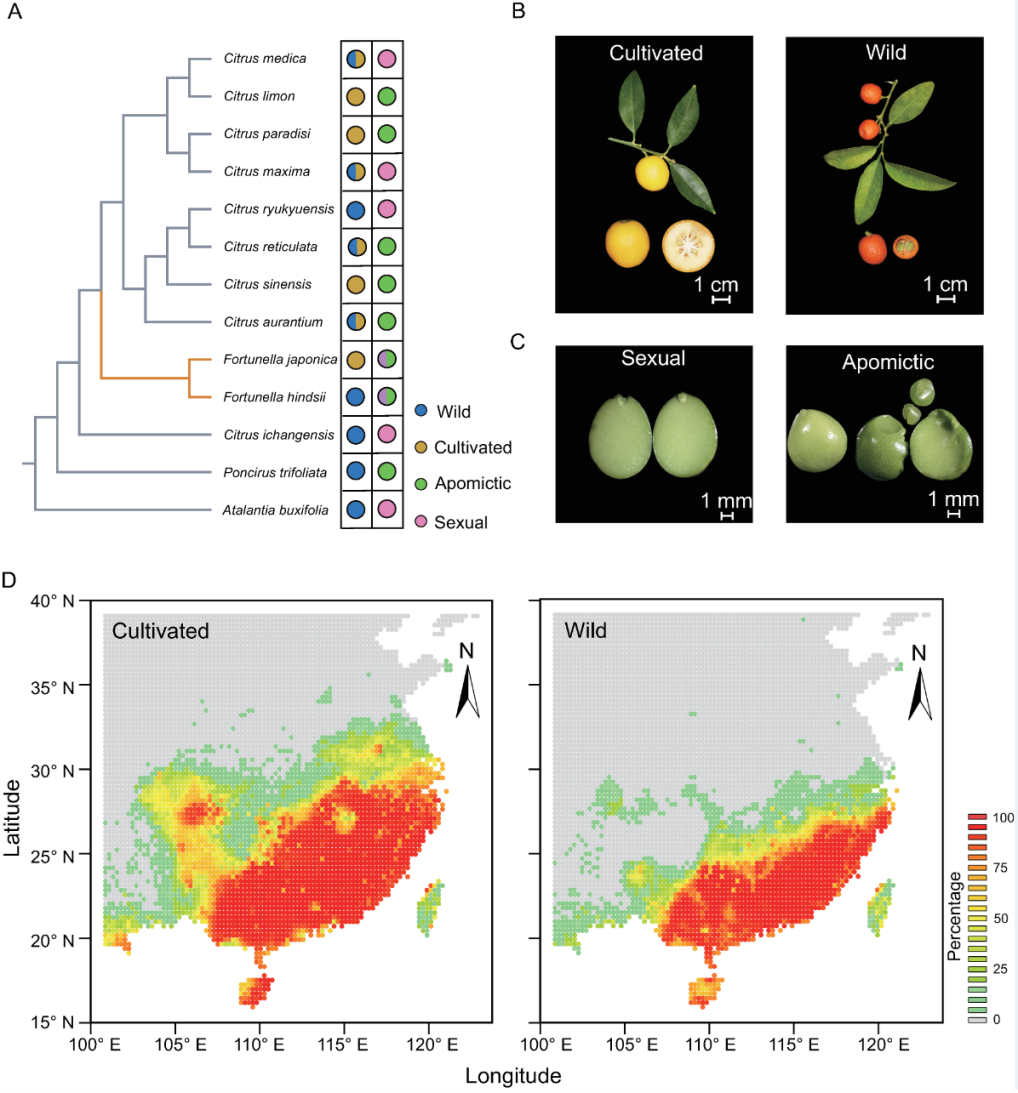南湖新闻讯(通讯员 王楠)近日,果蔬园艺作物种质创新与利用全国重点实验室邓秀新院士团队联合中国农业科学院深圳农业基因组研究所周永锋团队在国际期刊PLOS Genetics发表题为“Genomic conservation of crop wild relatives: a case study of citrus”的研究论文。该研究以野生山金柑为例,利用群体遗传学等研究方法对野生柑橘的遗传资源进行研究,提出关于柑橘遗传资源保护的新见解,同时为作物野生近缘种保护提供了新思路。
保护作物野生近缘种需重点关注受环境因素影响的遗传特征,例如低遗传多样性、近亲繁殖和小的有效群体。农业生产高度破坏了作物野生近缘物种的生境,栽培品种和野生种的生境重叠,导致栽培种中的基因向野生种流动,对野生种的“基因池”产生“污染”,使得作物野生近缘种具有较高遗传负荷。此外,由于作物野生近缘种具有不同的生殖模式系统,对于遗传资源的保护应该采用不同的措施。
基于上述背景,团队运用金柑属中栽培种和野生近缘种的全基因组测序数据,结合地理生态数据、生殖表型数据进行正向模拟分析,发现了野生种群中明显的群体碎片化现象,以及有效群体大小迅速下降、高度近交的遗传特征。进一步研究显示,野生种和栽培种具有高度重合的生态位,这导致栽培种的基因流持续向野生种流动。基于对群体水平的基因组负荷研究,团队发现栽培种群中有害变异位点多,基因渗入提高了野生种群的基因组负荷,进一步增加了野生种群灭绝的风险;在不同生殖模式的群体中,无融合生殖和自交不亲和性等特征对有效群体、基因流和遗传负荷均有影响。最后,基于群体遗传学的研究和野生种质资源的长期保护实践,团队提出了柑橘野生种群保护的具体建议和办法。

柑橘亚族系统发育、栽培金柑和近缘野生山金柑的不同生殖类型以及地理分布预测
据悉,华中农业大学博士、中国农业科学院深圳农业基因组研究所博士后王楠为该论文第一作者,华中农业大学邓秀新院士和中国农业科学院深圳农业基因组研究所周永锋研究员为该论文共同通讯作者。明尼苏达大学Peter L. Morrell教授和周永锋研究员课题组博士后刘众杰、肖华、徐小东、马志尧,硕士生曹硕等参与了该研究。我校柑橘团队郭文武教授、徐强教授、柴利军教授和叶俊丽副研究员对该研究的开展提供了重要指导。华中农业大学邓秀新院士课题组胡健兵博士,湖南省农科院园艺所陈鹏老师对该研究的材料和分析提供了重要帮助。该研究获得了国家重点研发计划、海外优青等项目的资助。
【英文摘要】
Conservation of crop wild relatives is critical for plant breeding and food security. The lack of clarity on the genetic factors that lead to endangered status or extinction create difficulties when attempting to develop concrete recommendations for conserving a citrus wild relative: the wild relatives of crops. Here, we evaluate the conservation of wild kumquat (Fortunella hindsii) using genomic, geographical, environmental, and phenotypic data, and forward simulations. Genome resequencing data from 73 accessions from the Fortunella genus were combined to investigate population structure, demography, inbreeding, introgression, and genetic load. Population structure was correlated with reproductive type (i.e., sexual and apomictic) and with a significant differentiation within the sexually reproducing population. The effective population size for one of the sexually reproducing subpopulations has recently declined to ~1,000, resulting in high levels of inbreeding. In particular, we found that 58% of the ecological niche overlapped between wild and cultivated populations and that there was extensive introgression into wild samples from cultivated populations. Interestingly, the introgression pattern and accumulation of genetic load may be influenced by the type of reproduction. In wild apomictic samples, the introgressed regions were primarily heterozygous, and genome-wide deleterious variants were hidden in the heterozygous state. In contrast, wild sexually reproducing samples carried a higher recessive deleterious burden. Furthermore, we also found that sexually reproducing samples were self-incompatible, which prevented the reduction of genetic diversity by selfing. Our population genomic analyses provide specific recommendations for distinct reproductive types and monitoring during conservation. This study highlights the genomic landscape of a wild relative of citrus and provides recommendations for the conservation of crop wild relatives.
论文链接:Genomic conservation of crop wild relatives: A case study of citrus | PLOS Genetics
审核人:柴利军
